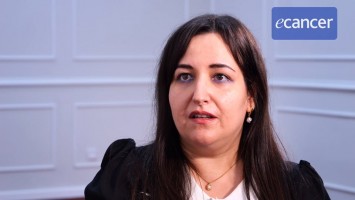WCCS 2016
Targetted medicine to reduce melanoma mutational burden
Prof Grant McArthur - The Royal Melbourne Hospital, Melbourne, Australia
At this year’s European Association of Dermato Oncology meeting, which is being held together with the World Congress of Cancers of the Skin, there’s a lot of quite interesting discussion around the theme of targeted therapies and the outcome in different subsets of patients. To me this is a really vital area of discussion because if we can understand on the one hand why some patients get very good outcomes with targeted therapies and on the other hand some patients do very poorly, one can tailor treatments, develop new treatments to get better outcomes for all patients.
So where we’re at with that is we’re identifying groups of patients with clinical parameters that are doing poorly, particularly patients with elevated lactate dehydrogenase treated with BRAF and MEK inhibition if coupled with multiple sites of disease, most notably in the liver, and patients with an ECOG performance status of 1 really signifying that their disease is causing some symptoms. This constellation of clinical factors, really the overall survival is very poor in patients with BRAF and MEK inhibition and so we need to innovate there. Then there’s the opposite group of patients, in fact, with targeted therapies doing very well with ECOG performance status of 0, normal LDH, no liver metastases, really excellent overall survival in these groups of patients.
So we’ve identified those groups now, and this is occurring both with vemurafenib and cobimetinib and also with dabrafenib and trametinib but what is underlying all of this which is most interesting is the biology. What’s it telling us about the molecular and cellular characteristics of the tumours and why they’re doing so poorly or not. There are some interesting findings, for example it has been discussed that CDKN2A mutations which regulates the kinase CDK4 is mutated, if it’s mutated patient outcome is worth treating with BRAF and MEK inhibitors leading to the possibility of adding in the new CDK4 inhibitors to these combinations; I particularly find that an interesting hypotheses. We’re also starting to talk about mutational burden and number of mutations in melanomas and what that might mean for outcome. Now what is really intriguing, the more mutations you seem to do better with targeted therapies. Counterintuitive – you’d think a more complex genome is going to do worse – but we think that may be because of the immune system kicking in in more highly mutated tumours.
So these are some emerging areas of biology interfacing with data from clinical outcome treated with BRAF MEK inhibitors that are going to be very useful in mapping out the path forward. However, fundamentally we still don’t have any clinical data yet from randomised trials as to targeted therapy versus immunotherapy and which one you should start. But certainly the results with targeted therapy most of us are finding now are perhaps better than we first anticipated in terms of overall survival.
So where we’re at now with the application of genomics in routine clinical practice for melanoma is we have our routine treatments. We clearly use BRAF mutations as a clear tool to delineate treatment options for patients, it’s now routine practice everywhere completely routinely. We then extend beyond that in many centres now to look for NRAS mutations because we know that there are agents such as MEK inhibitors that have some activity in those patients and there are very active clinical trial programmes targeting NRAS. There is, of course, KIT mutations in a subset of melanomas as well which, although the mainstay of treatment is immunotherapy for those tumours, there is some activity of KIT inhibitors, perhaps more in the salvage setting. These are all the routine use of targeting specific genes for analysis with sequencing.
What is of course very interesting is where does the new genomics sit, the ability to do whole exome sequencing or even whole genome sequencing and are we on the inevitable path that that is going to be used in routine clinical practice. I don’t think we’re there yet, what are the values of doing that sort of sequencing? Well there’s a lot of talk now about this total mutational burden in the genome and the importance of that biologically in the response to therapeutics. So if indeed that turns out to be a good marker, as early data suggests, for response to immune based therapies then, yes, that may be a useful technology to start to sequence more tumours.
One of the things, the Holy Grail in my mind, that has been presented at this meeting here is the concept of personalised cancer vaccines. Find out which proteins are mutated, generate peptides to generate a high affinity T-cell response to those mutated peptides. Overcome the immune checkpoint inhibitors to get the immune system to respond better to those vaccines and then maybe we’ll have truly personalised immunotherapy for patients. That future landscape has been laid out at this meeting and we’ll watch that space very carefully. Certainly if that technology comes through we’re going to need to sequence the whole exome in our patients but it’s not there yet for routine practice.
One point of discussion at the meeting, really outside of the sessions, is people are talking about brain metastases in melanoma. This is a problem. Our therapeutics, both immunotherapeutics and targeted therapeutics, are not very effective in terms of durability of response in patients with brain metastases. We need to do more there. It’s an area that needs significant innovation and, in fact, we’re talking, we need more sessions with very innovative biology discussed around brain metastases. This is an area of major unmet need in metastatic melanoma.








